Editors
L Howard Marshall
and
W. Ward Gasque
by
PAUL ELLINGWORTH
Translation Consultant
United Bible Societies




INTRODUCTION
COMMENTARY
INDEXES
While there have been many series of commentaries on the English text of the New Testament in recent years, it is a long time since any attempt has been made to cater particularly to the needs of students of the Greek text. It is true that at the present time there is something of a decline in the study of Greek in many traditional theological institutions, but there has been a welcome growth in the study of the New Testament in its original language in the new evangelical schools, especially in North America and the Third World. It is hoped that The New International Greek Testament Commentary will demonstrate the value of studying the Greek New Testament and help toward the revival of such study.
The purpose of the series is to cater to the needs of students who want something less technical than a full-scale critical commentary. At the same time, the commentaries are intended to interact with modern scholarship and to make their own scholarly contribution to the study of the New Testament. There has been a wealth of detailed study of the New Testament in articles and monographs in recent years, and the series is meant to harvest the results of this research in a more easily accessible form. The commentaries will thus include adequate, but not exhaustive, bibliographies. They will attempt to treat all important problems of history, exegesis, and interpretation that may arise.
One of the gains of recent scholarship has been the recognition of the primarily theological character of the books of the New Testament. This series will, therefore, attempt to provide a theological understanding of the text, based on historical-critical-linguistic exegesis. It will not, however, attempt to apply and expound the text for modern readers, although it is hoped that the exegesis will give some indication of the way in which the text should be expounded.
Within the limits set by the use of the English language, the series aims to be international in character; the contributors, however, have been chosen not primarily in order to achieve a spread between different countries but above all because of their specialized qualifications for their particular tasks. The supreme aim of this series is to serve those who are engaged in the ministry of the Word of God and thus to glorify his name. Our prayer is that it may be found helpful in this task.
1. Howard Marshall
W. Ward Gasque
 'he study of the Epistle to the Hebrews has been traditionally hampered by a number of factors.
'he study of the Epistle to the Hebrews has been traditionally hampered by a number of factors.
(1) For most of Christian history, its attribution to Paul has made it more difficult for readers to hear its distinctive voice.
(2) Among gentile Christians, it has been wrongly assumed that Hebrews was of interest only to those who stood in the Jewish tradition. "Is it necessary," it has often been asked, "in order to become a Christian, to understand and accept the entire rationale of Old Testament sacrifice?"
(3) It has sometimes even been thought that Hebrews represented some kind of compromise or halfway stage between Judaism and Christianity, in contrast with the pure message of the Gospels and the radical Christianity of Paul. This is in fact the reverse of the truth: although Hebrews maintains the continuity of God's people before and after Christ, the essential purpose of the epistle is to encourage the readers to base their lives on nothing less and nothing other than Jesus.
(4) The study of Hebrews in the west has suffered, more than that of most books of the Bible, from a dichotomy between Roman Catholic and Protestant exegetical traditions, with some Roman Catholic interpreters tending to assimilate the message of Hebrews to their own categories of priesthood and sacrifice, and some Protestant interpreters prevented by their own presuppositions from mediating any living understanding of priesthood and sacrifice at all.
These factors have tended to combine to give Hebrews generally an undeserved reputation for obscurity. Chapter 11, it is true, has largely escaped this fate, but it has conversely suffered from being read in isolation from the rest of the epistle.
In addition to these general factors, the study of Hebrews in the English-speaking world has suffered until recent times from a comparative lack of scientific commentaries of the first rank. The work of such scholars as A. B. Davidson, A. B. Bruce, B. F. Westcott, and J. Moffatt remains indispensable. More recently F. F. Bruce, P. E. Hughes, S. J. Kistemaker, H. W. Attridge, and W. L. Lane have done much to supply this lack. The present commentary is particularly indebted to the work of F. F. Bruce; in its final stages of preparation it has greatly benefited from the work of Attridge and Lane. It has unfortunately not been possible to take account of the recent commentary of H.-F. Weiss (Gottingen 1991).
Yet students of Hebrews remain at a significant disadvantage if they are unable to enter by adoption into the wealth of German exegesis; for since F. Delitzsch, few if any full-scale German commentaries have found an English translator, or a publisher in the English-speaking world. The work of F. Bleek (still not superseded in some respects after more than 150 years), Delitzsch, E. Riggenbach, O. Michel, and H. Braun, to name but a few, forms a diverse but coherent tradition of interpretation which is unequalled in English. In French, C. Spicq's monumental 1952 commentary is usefully complemented by his briefer 1977 contribution to the Sources Bibliques series, while the clear stream of Vanhoye's studies has run freely for more than thirty years.
Even to mention such names compels the author of yet another commentary to ask himself whether his work is really necessary; this question others must answer. I can only plead a long if intermittent interest in this epistle, beginning in 1955 when as a theological student I was invited to give a series of Bible studies on Hebrews to the Cambridge University Methodist Society; reviving in the late 1970s and early 1980s with research under Dr. (now Professor) I. Howard Marshall on the use of the Old Testament in Hebrews, and preparation with Dr. Eugene A. Nida of A Translator's Handbook on the Letter to the Hebrews, published by the United Bible Societies (UBS) in 1983; and confirmed by the invitation to write the present commentary. A brief commentary on Hebrews by the present writer was published in 1991 in the Epworth Commentaries series.

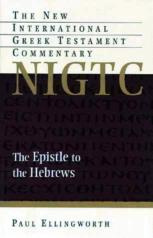
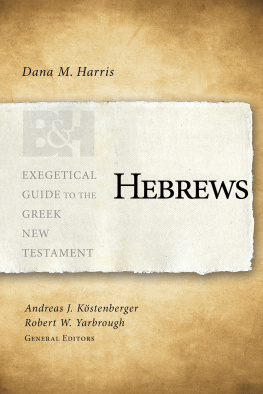
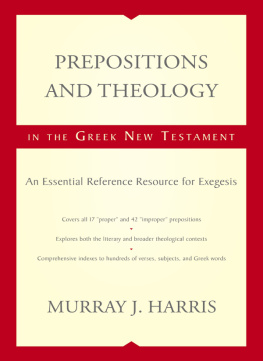
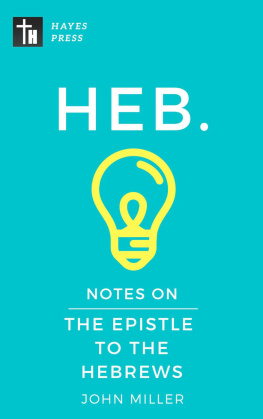


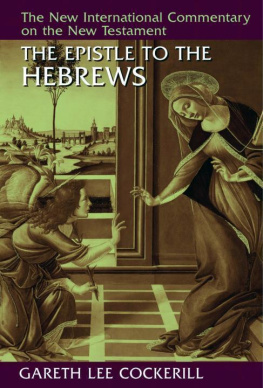
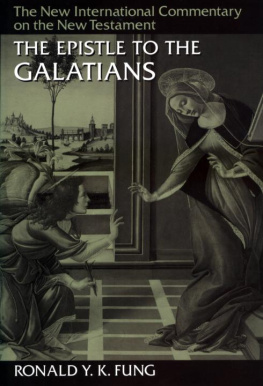

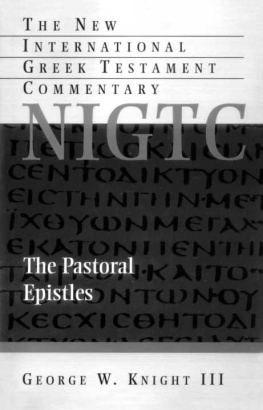
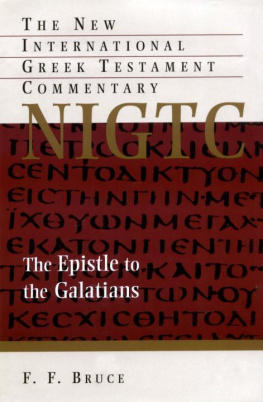
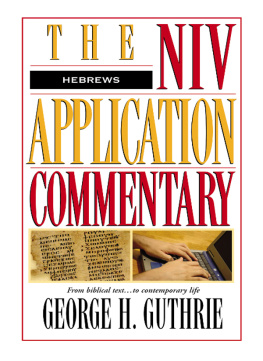

 'he study of the Epistle to the Hebrews has been traditionally hampered by a number of factors.
'he study of the Epistle to the Hebrews has been traditionally hampered by a number of factors.